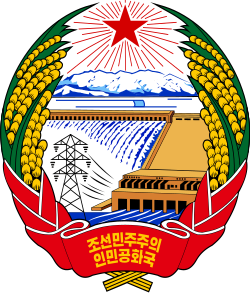| 조선민주주의인민공화국 국무위원회 | |
 | |
| Agency overview | |
|---|---|
| Formed | 29 June 2016 |
| Preceding agency | |
| Type | Supreme policy-oriented leadership body |
| Jurisdiction | Government of the Democratic People's Republic of Korea |
| Headquarters | Government Complex No. 1, Pyongyang |
| Agency executives |
|
| Korean name | |
| Hangul | 조선민주주의인민공화국 국무위원회 |
| Hanja | 朝鮮民主主義人民共和國國務委員會 |
| RR | Joseon minjujuui inmin gonghwaguk gungmu wiwonhoe |
| MR | Chosŏn minjujuŭi inmin konghwaguk kungmu wiwŏnhoe |
 |
|---|
The State Affairs Commission of the Democratic People's Republic of Korea (SAC) is constitutionally the supreme state policy organ of North Korea.
Contents
The State Affairs Commission was created by 2016 amendments to the North Korean Constitution to replace the previously military-dominated National Defence Commission. The Commission has the powers to deliberate and decide on major policies of the State including defence and security policies. It supervises the Cabinet of North Korea, as well as the Ministry of Defence, Ministry of State Security and the Ministry of Social Security and the Korean People's Army's General Staff Department and General Political Bureau.
The body is headed by the President of the State Affairs Commission, commonly styled in official North Korean releases as "President of State Affairs", who is defined as the head of state of the nation and the supreme leader. The position is held by the General Secretary of the Workers' Party of Korea. The current President is Kim Jong Un. The first vice-president is Choe Ryong-hae, who is also the Chairman of the Supreme People's Assembly Standing Committee.





